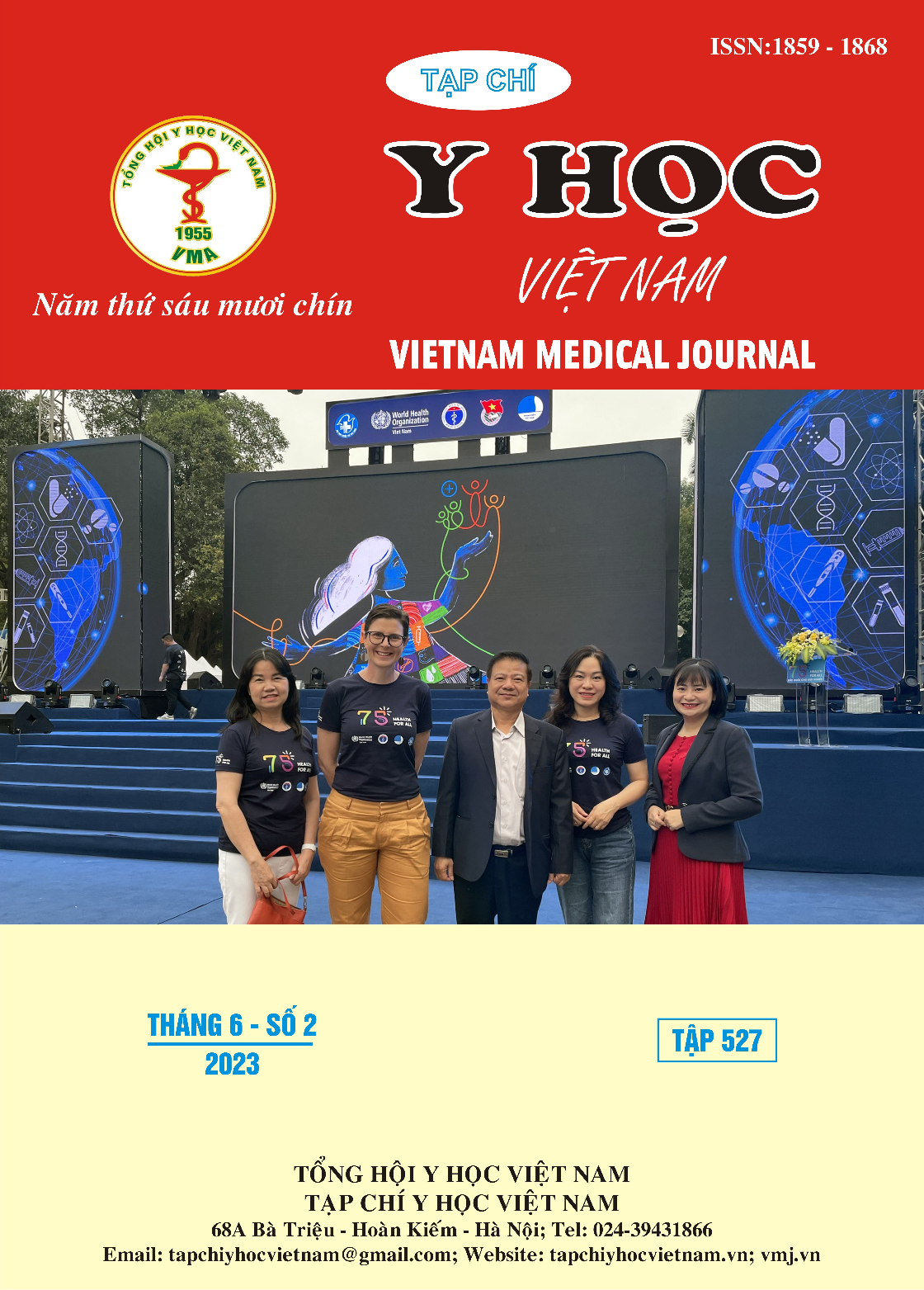ASSESSMENT OF EXTENDED LIVE TIME OF HCC PATIENTS TREATED WITH HIGH-FREQUENCY ABLATION AT THE GASTROENTEROLOGY DEPARTMENT OF BACH MAI HOSPITAL
Main Article Content
Abstract
Background: Hepatocellular carcinoma (HCC) is one of the common malignancies with poor prognosis and rapid death. Radiofrequency ablation is one of the simple and fast local treatments that promise effective results and less complications. Objectives: (1) To evaluate the results of treatment of primary hepatocellular carcinoma by radiofrequency ablation according to mRECIST. (2) Evaluation of survival time. Method: cross-sectional descriptive study. The study was carried out at the Department of Gastroenterology - Bach Mai Hospital from October 2011 to June 2017. Results: The response rates after 1 month, 3 months and 6 months of treatment were 96%, 96.7% and 91.3%, respectively, of which the complete response rate was 68.9%, 79.5% and 76.5%, respectively. The median overall survival was 51.4 months. The survival rate of patients after 1 year, 3 years and 5 years was 94%, 74.2% and 43.2%, respectively. The median progression-free survival was 48.7 months. Conclusion: Radiofrequency ablation is a highly effective local treatment and prolongs the survival time of patients with HCC.
Article Details
Keywords
hepatocellular carcinoma, radiofrequency ablation, mRECIST, survival time.
References
2. Đào Văn Long (2009). Đánh giá kết quả điều trị ung thư gan bằng phương pháp đốt nhiệt sóng cao tần. Báo cáo kết quả nghiên cứu đề tài cấp bộ. Bộ Y tế.
3. Wang N. Y., Wang C., Li W., et al. (2014). Prognostic value of serum AFP, AFP-L3, and GP73 in monitoring short-term treatment response and recurrence of hepatocellular carcinoma after radiofrequency ablation. Asian Pac J Cancer Prev, 15 (4), 1539-1544.
4. Trần Nhựt Thị Ánh Phượng, Lê Thành Lý, Nguyễn Đình Song Huy và cs (2015). Hiệu quả của đốt nhiệt sóng cao tần trên ung thư biểu mô tế bào gan không đáp ứng hoàn toàn với thuyên tắc hóa trị qua động mạch. Hội nghị Hội Khoa học tiêu hóa Việt Nam. Vinh, ngày 13 - 14/11/2015.
5. Yan K., Chen M. H., Yang W., et al. (2008). Radiofrequency ablation of hepatocellular carcinoma: long-term outcome and prognostic factors. Eur J Radiol, 67 (2), 336-347.
6. Pompili M., Saviano A., de Matthaeis N., et al. (2013). Long-term effectiveness of resection and radiofrequency ablation for single hepatocellular carcinoma =3 cm. Results of a multicenter Italian survey. J Hepatol, 59 (1), 89-97.
7. Đào Việt Hằng và Đào Văn Long (2016). So sánh kết quả điều trị ung thư biểu mô tế bào gan bằng phương pháp đốt sóng cao tần với hai hệ thống kim chùm LeVeen và kim Cooltip. Tạp chí Y dược lâm sàng 108, tr. 173-179.
8. Gralnek I.M, Barkun A.N, Bardou M, et al. (2008). Management of Acute Bleeding from a Peptic Ulcer. New England Journal of Medicine, 359 (9), 928-937.
9. Zhang W., Luo E., Gan J., et al. (2017). Long-term survival of hepatocellular carcinoma after percutaneous radiofrequency ablation guided by ultrasound. World J Surg Oncol, 15 (1), 122.
10. Hà Vương Thu (2015). Nghiên cứu hiệu quả bước đầu điều trị ung thư biểu mô tế bào gan kích thước trên 3cm băng phương pháp nút mạch hóa chất kết hợp đốt sóng cao tần, Luận văn bác sĩ nội trú, Trường Đại học Y Hà Nội.


